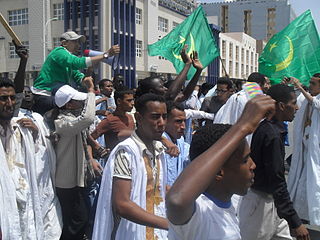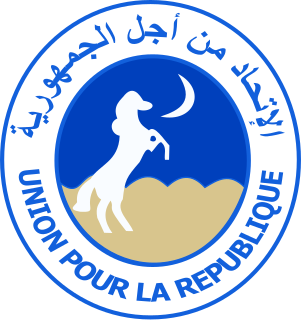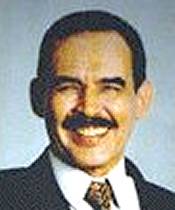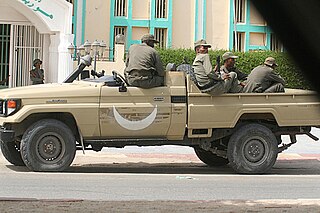
The first fully democratic Presidential election since 1960 occurred on 11 March 2007. The election was the final transfer from military to civilian rule following the military coup in 2005. This was the first time the president was selected by ballot in the country's history. The election was won by Sidi Ould Cheikh Abdallahi, who was ousted by a military coup in 2008 and replaced by general Mohamed Ould Abdel Aziz.

The Union of the Forces of Progress is a left leaning political party in Mauritania.

Colonel Ely Ould Mohamed Vall was a Mauritanian political and military figure. Following a coup d'état in August 2005, he served as the transitional military leader of Mauritania until 19 April 2007, when he relinquished power to an elected government.

The Military Council for Justice and Democracy was the supreme political body of Mauritania. It served as the country's interim government following the coup d'état which ousted the President, Maaouya Ould Sid'Ahmed Taya on 3 August 2005. It was led by the former director of the national police force, Colonel Ely Ould Mohamed Vall. After seizing power it quickly pledged to hold elections within two years, and promised that none of its own members would run. A few days after seizing power, Vall named Sidi Mohamed Ould Boubacar as Prime Minister following the resignation of Taya's last Prime Minister, Sghair Ould M'Bareck.

A Mauritanian presidential election occurred on 11 March 2007. Since no candidate received a majority of the votes, a second round was held on 25 March between the top two candidates, Sidi Ould Cheikh Abdallahi and Ahmed Ould Daddah. Abdallahi won the second round with about 53% of the vote and took office in April.
Ahmed Ould Daddah is a Mauritanian economist, politician and civil servant. He is a half-brother of Moktar Ould Daddah, the first President of Mauritania, and belongs to the Marabout Ouled Birri tribe. He is currently the President of the Rally of Democratic Forces (RFD) and was designated as the official leader of the opposition following the 2007 presidential election, in which he placed second.

Sidi Mohamed Ould Cheikh Abdallahi is a Mauritanian politician who was President of Mauritania from 2007 to 2008. He served in the government during the 1970s, and after a long period of absence from politics he won the March 2007 presidential election, taking office on 19 April 2007. He was deposed in a military coup d'état on August 6, 2008.
Saleh Ould Hanenna is a former Mauritanian soldier and political figure.
Moulaye Ould Mohamed Laghdaf served as the Prime Minister of Mauritania from August 2008 until August 2014.

A presidential election was held in Mauritania on 18 July 2009. Mohamed Ould Abdel Aziz, who led the 2008 coup d'état, won a narrow first-round majority in the election, according to official results. A second round, if necessary, would have been held on 1 August 2009.

Ba Mamadou dit Mbaré was a Mauritanian politician who served as President of the Senate of Mauritania from 2006 until his death. As President of the Senate, he succeeded Mohamed Ould Abdel Aziz as Head of State on 15 April 2009, when Abdel Aziz resigned to take part in the June 2009 presidential election. Abdel Aziz was then elected President and in turn succeeded Mbaré on 5 August 2009.

Parliamentary elections were held in Mauritania on 23 November. The opposition has vowed to boycott the election unless the president steps down beforehand. A total of 1,096 candidates have registered to compete for the leadership of 218 local councils across Mauritania, whilst 438 candidates are contesting for the 146 parliamentary seats. Some 1.2 million Mauritanians were eligible to vote in the election. The first round results yielded a landslide victory for the ruling UPR winning 56 seats and their 14 coalition partners winning 34 seats. The Islamist Tewassoul party won 12 seats. The remaining seats were contested in a runoff on 21 December 2013. The UPR won the majority with 75 seats in the Assembly.

The High Council of State was the supreme political body of Mauritania. It served as the country's interim government following the coup d'état which ousted the President, Sidi Mohamed Ould Cheikh Abdallahi on August 6, 2008. It was led by General Mohamed Ould Abdel Aziz. After seizing power it quickly pledged to hold elections "in the shortest possible period". A few days after seizing power, Abdel Aziz named Mauritanian Ambassador to Belgium and the European Union, Moulaye Ould Mohamed Laghdaf, as Prime Minister.

The 2011–12 Mauritanian protests are a series of protests in Mauritania that started in January 2011, concurrent with the Arab Spring, and continued into 2012. The largely peaceful protest movement has demanded President Mohamed Ould Abdel Aziz institute political, economic, and legal reforms. Common themes of protest have included slavery, which is officially illegal in Mauritania, but is widespread in the country, and other human rights abuses the opposition has accused the government of perpetrating.

El Wiam is a centrist political party in Mauritania led by Boïdiel Ould Houmeit. It is made up mainly of ex-officials from the regime of Maaouiya Ould Taya.














